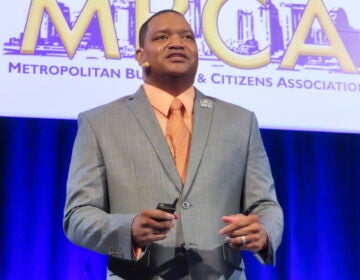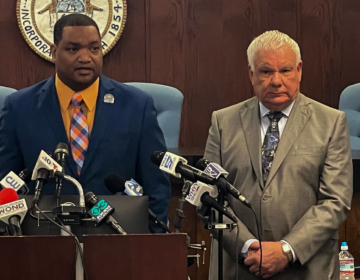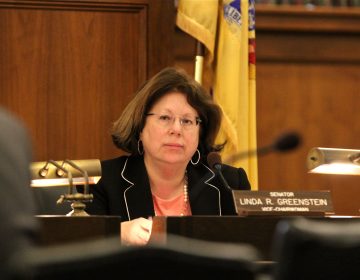Timeline for implementing New Jersey’s teacher tenure reform law
This is part of a series from education blogger Laura Waters of NJ Left Behind.
Late October in Atlantic City? It must be time for N.J. School Boards Association’s Annual Workshop and Exhibition. Picture it: school board members and administrators in grey blazers and sensible shoes roaming Atlantic City’s cavernous Convention Center, attending sessions like “Energy Improvement Program (ESIP): How to Implement Energy Facilities Projects Without Spending More Money” and “Voluntary Model Curricula and Assessments Aligned with the Common Core Standards,” indulging in that perennially favorite activity of snatching up free candy and pens from vendors in the Exhibition Hall. Can anyone say “PAR-TAY!”
(Actually, yes. Your staid school board members might surprise you.)
So, what’s the vibe here? I hear none of last year’s inflamed political rhetoric about tenure and teacher evaluation reform and nary a debate about the wisdom or idiocy of N.J.’s pending shift from binary (satisfactory/unsatisfactory) and superficial teacher and principal annual reviews to granular evaluations infused with meaningful direction and longitudinal data. I see no rending of garments over the unreliability of measuring student growth through standardized tests or the subjectivity of classroom observations.
Instead, school board members and administrators are preoccupied with the nuts and bolts of implementing the new teacher tenure law, signed this past August by Gov. Christie. A pilot program involving about 25 districts started last year. All districts are currently in preparation mode for the complete roll-out next September.
Here’s the official timeline from the DOE:
*Form a District Evaluation Advisory Committee (DEAC) to ensure stakeholder engagement by Oct 31, 2012.
*Adopt educator evaluation rubrics that include state-approved teacher and principal practice evaluation instruments by Dec 31, 2012.
*Begin to test and refine evaluation rubrics by Jan 31, 2013.
*Form a School Improvement Panel to oversee evaluation activities by Feb 1, 2013.
*Thoroughly train teachers by July 1, 2013.
*Thoroughly train evaluators by Aug 31, 2013.
No wonder board members and administrators are passing around antacids.
At various sessions over the two and a half day Workshop, convention-goers heard advice from districts in the pilot program, hoary old veterans schooling virginal newbies. For example, Tuesday morning’s agenda included an “action lab” in which administrators from Secaucus School District (Hudson County), one of the pilot districts, highlighted the challenges involved in implementing the new regulations, describing the changes as a “big paradigm shift” and a “seismic change.”
Issues addressed included: how do districts get their technology infrastructure sufficiently robust to process the jaw-dropping amount of data engendered by this new system? (For many, it’s like transforming a country road to a twelve-lane highway.) And where do you get the money to pay for technology upgrades?
How do our principals and administrators find the time the hours necessary to conduct, as required, five formal 30-minute evaluations of each non-tenured teacher? (One Secaucus administrator calculated that each principal will now spend 110 hours observing teachers, a big shift with no ready remedy for covering other prescribed responsibilities.)
How do districts integrate student growth data into evaluations of staff members who don’t have standardized tests in their subjects, e.g., gym teachers and social workers and nurses? (One answer: districts must develop them “in house,” with each developing its own set of benchmark assessments, despite pleas by pilot districts to the DOE for a more efficient regimen.)
How does a district incorporate standardized test scores into teacher evaluations when those test scores are not released by the DOE until the late summer but final summative annual evaluations are due in early summer?
(A few answers came later that day at a panel moderated by NJ Spotlight’s John Mooney, which included N.J.’s governmental relations directors from unions and other groups. Mike Vrancik of NJSBA confirmed that “folks were scrambling” to meet the DOE’s mandated Dec. 31st deadline to pick evaluation models. He also shared that he’d heard from a DOE official that the timeline might have to be “tweaked.”)
The good news is that everyone — board members, administrators, union officials, other lobbyists — have either embraced N.J.’s new teacher evaluation and tenure legislation or have resigned themselves to its implementation. The bad news is that no one is sure how the DOE is going to pull it off.
Laura Waters is president of the Lawrence Township School Board in Mercer County. She also writes about New Jersey’s public education on her blog NJ Left Behind. Follow her on Twitter @NJLeftbehind.
WHYY is your source for fact-based, in-depth journalism and information. As a nonprofit organization, we rely on financial support from readers like you. Please give today.




